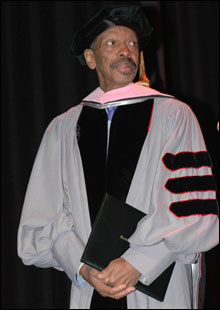 Berklee professor Bill Banfield began his interview with Ornette Coleman January 17 at the Berklee Performance Center by recounting the time he told a friend he was going to be visiting Ornette and the friend exclaimed, “You’re going to speak to God! Tell God I said hello!”
Berklee professor Bill Banfield began his interview with Ornette Coleman January 17 at the Berklee Performance Center by recounting the time he told a friend he was going to be visiting Ornette and the friend exclaimed, “You’re going to speak to God! Tell God I said hello!”
The audience — on hand for the opening festivities for Berklee’s annual “Teachers on Teaching” conference and to see Coleman receive an honorary doctorate from the college — laughed, and Ornette, sitting on stage to Banfield’s left, held his hand over his face in embarrassment.
Berklee Teachers on Teaching (“Bee-TOT,” in the parlance) is a nuts-and-bolt conference on musical pedagogy (a “stress reduction” seminar was scheduled for later in the afternoon), but as you’d expect, Coleman was anything but nuts-and-bolts. There were various introductions by Berklee administrators and dignitaries. Piano-faculty professor JoAnne Brackeen and alto-saxophonist grad Greg Osby (Berklee ’83) essayed free, succinct takes on three Coleman pieces (“Giggin’,” “Mob Job,” and “The Thin Blue Line”), and Brackeen, a long-time friend of Coleman who knew him in LA in the ’50s and saw the legendary Hillcrest Club performances, offered a rambling, affectionate introduction.
Then, the man himself, dapper as always, in a powder-blue suit (later covered by an academic gown), electric-blue tie, and check shirt, answered Banfield’s interlocutions. Every question was of the practical “what do we tell our students” variety, but Coleman’s answers emerged as puzzles and parables, Delphic utterances. Surely an audience with the Dalai Lama could get no more philosophical. When Banfield cheerfully asked his first question about “what kind of things should we be teaching the students,” Ornette, speaking very quietly and in his round-about fashion, said, in part, “You don’t have to die to be born, but you have to be born to die. . . . The human being is eternal.”
Answers kept circling back to the topics of birth, death, race, God, the Bible, and “feeling.” And they weren’t without humor. When Banfield mentioned Ornette’s new title, Ornette interjected, “I need a doctor.” He recalled his childhood in Texas, where, he said, he lived mostly around women, since his father had died when he was seven. And he remembered his mother. “She never went anywhere, all she had was her Bible. And she would tell me things that were much more advanced than what I was learning on the street. She never tried to achieve anything of value or tried to be anything intellectually more or less, she was just being who she was, herself. And she could do so much without, and she really taught me how to do without. And I have perfected that.” Audience laughter.
On race: “Probably one of the saddest things that exists is that whatever race you are, if you don’t want to be that race, you can’t. Whatever it is that you can’t do is what someone wants you to do.”
And: “Even if you call yourself ‘white’ and ‘black,’ when you look in the mirror, you don’t see what you call yourself.”